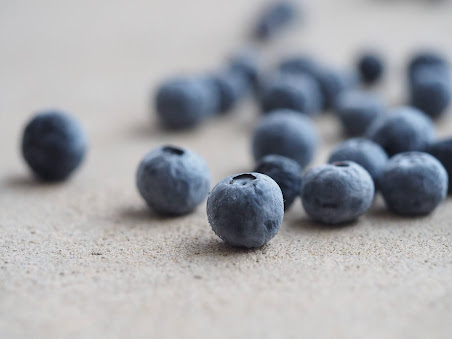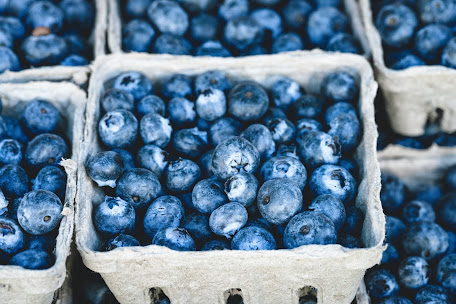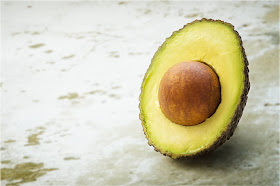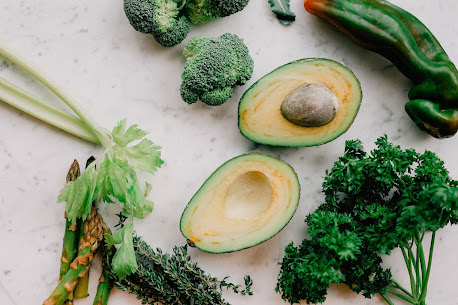BLUEBERRIES (Health Fitness)
 |
| Blueberries Health Fitness |
Blueberry is another super food that offers many health benefits.
Like strawberries, blueberries contain anthocyanins, a powerful antioxidant. Because of this, they can protect against heart disease, stroke, cancer and other diseases. Health Fitness
Blueberries contain a compound called thorostilbin, which can prevent plaque buildup in the arteries.
Fresh Blueberries Summer Treat. They have a sweet taste, and are juicy and nutritious.
Blueberries can be picked fresh or added to most dishes. Can freeze them.
They have been shown to protect against heart disease and cancer and also help maintain bone strength, mental health and healthy blood pressure.
Fast facts on blueberries
Blueberries contain a plant compound called anthocyanin. This blueberry gives both their blue color and their health benefits. Cup One cup of blueberries provides 24 percent of the recommended daily allowance of vitamin C per person.
Top Use blueberries for waffles, pancakes, yogurt, oatmeal or whole grains, mix them into a smoothie or syrup or fold them into muffins and sweet pastries.
Blood-thin people like Vif Warfarin should talk to their doctor before increasing their blueberry intake, as high vitamin K content affects the blood. Blueberry is a plant. The fruit is usually eaten as food. Some people also use fruits and leaves to make medicine. Be careful not to confuse blueberries with blueberries. Outside the United States, U.S. The name "blueberry" is used in can for a plant called "bilberry". Blueberries are used for aging, memory and thinking skills (cognitive function) and many other conditions, but there is limited scientific evidence to support these uses.
Blueberries, like their relative cranberries, help prevent bladder infections by preventing bacteria from entering the bladder walls. Blueberries are high in fiber, which helps with normal digestion. It also contains vitamin C and other antioxidants. Blueberries also contain chemicals that reduce inflammation and destroy cancer cells. Health Fitness
In India, blueberries do not attract the same attention when killed as ice creams, smoothies and other desserts, but it certainly has its own fan following. It is a proud member of the special category of superfoods, so it goes without saying that it has many health-beneficial properties under its belt. These wild berries are native to North America and have been used in cooking, soups and meats since ancient times. Its flavors combine well with many dishes, especially desserts that are famous for making muffins, cheesecakes and tarts. The dark blue color makes it an excellent choice for attire as it works seamlessly to enhance simple presentations. Talk about folk tales, Native Americans call it 'Star Berries', which are considered gifts of the Great Spirit. Various parts of the plant have been used for their medicinal properties, such as the leaves made from tea, which is considered a blood purifier, and the juice of the berries is said to cure coughs and colds. The berries are collected, dried and stored for the winter so that there is no shortage. With colonization, blueberries became more popular and were stored in bulk as the canning industry grew. Today, blueberries are available in fresh form (often the most expensive in India), canned, dried and composted.
BENEFITS OF BLUEBERRIES
 |
| Health Fitness |
Maintaining healthy bones
Blueberries contain iron, phosphorus, calcium, magnesium, manganese, zinc and vitamins. Each of these is a part of the bone. Adequate intake of these minerals and vitamins helps to build and maintain bone structure and strength. Iron and zinc play an important role in maintaining the strength and resilience of bones and joints. However, adequate vitamin K intake improves calcium absorption and reduces calcium deficiency. Health Fitness
Super source of antioxidants
Blueberries are an energy center of antioxidants, especially anthocyanins, which give it its dark blue color, as well as help remove free radicals from the blood and thus protect the Blueberries are generally said to have the highest antioxidant capacity among fruits and vegetables. And its regular intake not only helps the cardiovascular system, it also protects against neurodegenerative diseases and digestive diseases. . The main antioxidant compounds in blueberries are called flavonoids. Antioxidants protect the body from free radicals, which are volatile molecules that damage cells and contribute to diseases such as aging and cancer. Antioxidants protect your body from free radicals, which are volatile molecules that damage your cells and contribute to diseases such as aging and cancer. Polyphenols, the main antioxidant compound in blueberries, belong to the family of antioxidants, called flavonoids. In particular a group of flavonoids - anthocyanins - are believed to be responsible for the beneficial health effects of these berries. Health Fitness
Skin health
Collagen Skin Support System. It relies on vitamin C as an essential nutrient and protects the skin from damage due to sunlight, pollution and smoke. Vitamin C improves the ability of collagen to reduce sensitive wrinkles and improve overall skin texture.
Collagen Skin Support System. It relies on vitamin C as an essential nutrient and protects the skin from damage. Vitamin C improves the ability of collagen to increase sensitive wrinkles and improve overall skin texture. One cup of blueberries provides 24 percent of the daily allowance of vitamin C.
Low blood pressure
Maintaining a low sodium level is essential to keep blood pressure at a healthy level. Blueberries are sodium free.
They contain potassium, calcium and magnesium. Some studies have shown that diet in these minerals is associated with lower blood pressure. Adequate intake of these minerals is thought to help lower blood pressure.
However, other studies have retaliated with these results. Blueberries contain potassium, calcium and magnesium. Some studies have shown that diet in these minerals is associated with lower blood pressure. Adequate intake of these minerals is thought to help lower blood pressure. Also, blueberries are sodium-free, which helps keep blood pressure at a healthy level. Blueberries are an important benefit for people with high blood pressure, which is a major risk factor for heart disease. In an eight-week study, people with eczema had an increased risk of heart disease, and their blood pressure dropped by 2–6% after eating 2 ounces (50 g) of blueberries a day. Other studies have found similar effects - especially for menopausal women.
Diabetes management
Studies have shown that people with type 1 diabetes have lower blood sugar levels than those who eat a high-fiber diet, and people with type 2 diabetes have lower blood sugar, lipid and insulin levels. One cup of blueberries contributes 3.6 grams (g) of fiber.
A large 2013 coordinated study published in BMJ suggested that certain fruits reduce the risk of type 2 diabetes in adults. In the study, 6.5 percent of the participants had diabetes. Blueberries provide moderate sugar compared to other fruits. One cup (148 grams) contains 15 grams of sugar, which is equivalent to a small apple or a large orange (1). However, the bioactive compounds in blueberries affect the negative effects of sugar on blood sugar control. Research suggests that the anthocyanin in blueberries may have beneficial effects on insulin sensitivity and glucose metabolism. These anti-diabetic effects occur with blueberry juice and extracts. In a study of 32 ese-resistant people with insulin resistance, two blueberry smoothies per day caused major improvements in insulin sensitivity. Improved insulin sensitivity should reduce the risk of metabolic syndrome and type 2 diabetes, which are currently two of the largest health problems in the world.
Prevention of heart disease
Lack of cholesterol from blueberries is also good for the heart. Fiber content can help lower total cholesterol in the blood and reduce the risk of heart disease.
Excess homocysteine builds up in the body, damaging blood vessels and leading to heart problems.
Harvard School of Public Health in the United Kingdom and according to the study by the University of East Anglia, UK. Anthocyanin intake reduces the risk of heart attack in young and middle-aged women by up to 32 percent. Health Fitness
Because blueberries are loaded with antioxidants, they can help check cholesterol levels. Studies show that they help improve the balance of fat in the blood and prevent arterial occlusion. It is important to note that eating blueberries lowers blood pressure and oxidizes LDL cholesterol, which are risk factors - not actual diseases. It would be more informative to know if blueberries can help prevent difficult end points such as heart attack, which is the leading cause of death in the world. A study of 93,600 nurses found that blueberries had a higher intake of anthocyanin, a major antioxidant - with a 32% higher risk of heart attack than low intake. Since this is an empirical study, it cannot be proved that anthocyanin alone reduced the risk. Further study is required before making any claim.
Cancer prevention
Vitamin C, Vitamin A and various phytonutrients in blueberries act as powerful antioxidants that help protect cells from damage from free radicals associated with them. Oxidative DNA damage is an inevitable part of daily life. It is said to occur thousands of times a day in every cell of your body. The reason we grow is DNA damage. It plays an important role in the development of diseases such as cancer. Blueberries are high in antioxidants, which neutralize some of the free radicals that damage your DNA. In one study, 168 people drank 34 ounces (1 liter) of mixed blueberry and apple juice per day. Four weeks later, oxidative DNA damage due to free radicals was reduced by 20%. These results are consistent with smaller studies using fresh or dried blueberries.
Improve mental health
Population-based studies have shown that blueberry consumption is associated with slower cognitive decline in older women. In addition to reducing the risk of cognitive impairment, studies have found that blueberries also improve a person's short-term memory and motor coordination. Some studies have shown that blueberry consumption is associated with slower cognitive decline in older women. In addition to reducing the risk of cognitive impairment, blueberries also improve a person's short-term memory and motor coordination.
Healthy digestion, weight loss and feeling full
Blueberries help prevent constipation and maintain regularity to a healthy digestive system due to its fiber content. High fiber foods increase satiety, or make you feel full and reduce appetite. Prolonged satiety reduces a person's total calories. Health Fitness
Improves brain health
Studies have shown that regular consumption of blueberries can help improve brain health. The wonderful ingredients in blueberries improve memory, as well as reduce the risk of age-related cognitive disorders. One study found that men who ate fruits such as blueberries, along with other flavonoid-rich foods, were 40 percent less likely to develop brain diseases such as Parkinson's. And people who eat berries once a week can reduce their risk of the disease by a quarter compared to those who have never eaten them. Blueberries help reduce the risk of oxidative stress in our nerve cells, making them easier to work with. Oxidative stress accelerates the aging process of your brain, adversely affecting brain function. They benefit aging neurons, thereby improving cell signaling. Human studies have also given good results. In one of these studies, nine adults with mild cognitive impairment consumed blueberry juice daily. After 12 weeks, he experienced an improvement in several signs of brain function. A six-year study of more than 16,000 individuals found that blueberries and strawberries were associated with a 2.5-year delay in mental aging.
Promotes immunity
According to a study by Oregon State University, resveratrol in red grapes and parastostilin in blueberries enhance immunity by enhancing the activity of a gene called the human catheldin antimicrobial peptide, or CMP gene. Added. The CAMP gene has been the subject of much study, as it has been shown to play an important role in the "natural" immune system or in the first line of the body's ability to protect and fight bacterial infections. The natural immune response is important because most antibiotics lose their effectiveness rapidly. In addition, the flavonoids in blueberries also have anti-inflammatory properties and significantly reduce the risk of catching coughs and colds.
A high fat diet is harmful
According to a paper published in the Public Library of Science (PLOS) One magazine, eating wild blueberries reduces the negative effects of a high-fat diet. Wild blueberries or bilberries are smaller than normal blueberries and more acidic in nature. Researchers at the University of Eastern Finland have found that it has beneficial effects on both hypertension and nutrient-deficient inflammation. Low-level inflammation and increased blood pressure are often associated with esophageal diseases.
Blood Diabetes Health Fitness
Numerous studies have found that blueberries are beneficial for people suffering from blood sugar related problems such as diabetes and insulin resistance. These berries help control sugar levels and are also good for those with ese balance. They have a low GI (glycemic index), and one to two cups of blueberries, as well as other flavonoid-rich fruits, give you much-needed health boost when eaten regularly.
Blueberries protect your blood cholesterol from being damaged.
Oxidative damage is not limited to your cells and DNA. This can also be problematic when your "bad" LDL cholesterol gets oxidized. In fact, the oxidation of “bad” LDL cholesterol is an important step in the cardiovascular process. The antioxidants in blueberries are strongly associated with low levels of oxidized LDL. It makes blueberries great for your heart. Serving 2 ounces (50-grams) of blueberries daily can reduce LDL oxidation by 27% in eight weeks in people with ese balance. Another study found that eating 2.5 ounces (75 grams) of blueberries with a staple diet significantly reduced the oxidation of "bad" LDL cholesterol. Health Fitness


























